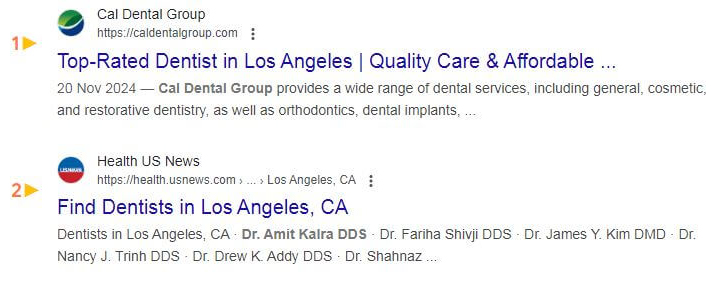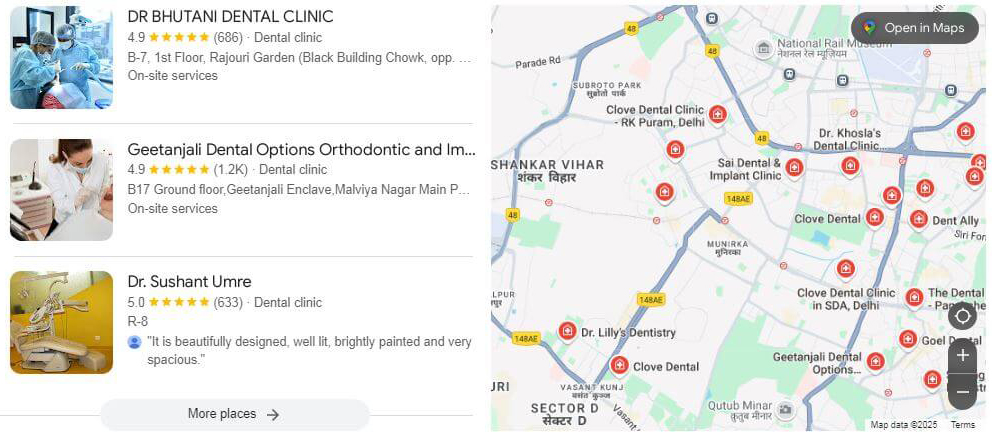A Comprehensive Guide to Growing Your Medical Practice
Having a strong online presence is no longer optional for healthcare professionals—it’s essential.


In today’s digital age, Search Engine Optimization (SEO) is a powerful tool that can help doctors, clinics, and hospitals attract more patients, build trust, and grow their practice. This guide will walk you through everything you need to know about SEO for doctors in India, from the basics to advanced strategies, and how our digital marketing agency can help you achieve your goals.
What is Medical SEO?
Medical SEO in India is a specialized form of search engine optimization that focuses on optimizing medical websites for search engines like Google and Bing. It involves keyword research, on-page SEO, technical SEO, local SEO, and content marketing to help doctors website rank higher in search results and attract more patients.
How SEO Helps Healthcare Professionals Grow?
SEO helps doctors by increasing online visibility, building trust with patients, and improving website traffic. It enables healthcare professionals to rank higher for relevant keywords such as "best dentist near me" or "top cardiologist in Delhi", thereby driving more patients to their clinics. A well-optimized medical website leads to higher appointment bookings, patient engagement, and long-term growth.
Difference Between General SEO and SEO for Doctors
Unlike general SEO, which focuses on various industries, SEO for doctors in Delhi, India requires compliance with medical guidelines, patient privacy laws, and expertise-driven content. Google emphasizes E-E-A-T (Experience, Expertise, Authoritativeness, and Trustworthiness) for medical content, meaning that SEO for doctors must prioritize accurate and trustworthy medical information.
Why Doctors Need a Strong Online Presence
- Patients search for doctors online – Over 70% of patients use Google to find a doctor.
- Online reviews influence decisions – Positive reviews improve trust and credibility.
- Higher search rankings mean more appointments – Being on the first page of Google increases patient inquiries and bookings.
Keyword Research
Keyword research is the process of identifying and analyzing search terms that users enter into search engines to
optimize content for better visibility. It helps in targeting the right audience, improving rankings, and driving organic traffic.
Finding High-Intent Keywords (Local & Global)
Keyword research is crucial for SEO in the medical field, helping doctors identify high-intent search terms. These keywords fall into local and global categories. Local keywords, like "Best dentist near me" or "Top cardiologist in Noida," attract nearby patients. In contrast, global keywords, such as "IVF treatment cost" or "Best LASIK surgery," target a broader audience seeking medical information or treatments. By focusing on both, healthcare professionals can enhance their online visibility and connect with potential patients effectively.
Long-Tail Keywords vs. Short-Tail Keywords
Short-tail keywords, such as "dentist," are broad, highly competitive, and more challenging to rank for due to their high search volume. In contrast, long-tail keywords, like "affordable dentist for braces in NYC," are more specific, less competitive, and often lead to higher conversion rates as they better match user intent. While short-tail keywords attract a larger audience, long-tail keywords are more effective in targeting users who are closer to making a decision, making them a valuable part of an SEO strategy.
Competitor Analysis for Keyword Strategy
Conducting competitor analysis for keyword strategy is essential for identifying gaps and opportunities in your own SEO efforts. By analyzing the keywords that competitors rank for, you can uncover valuable insights into high-performing search terms and areas where you can gain a competitive edge. Tools such as SEMrush, Ahrefs, and Google Keyword Planner can help track competitor rankings, discover new keyword opportunities, and refine your SEO strategy for better visibility and engagement.

On-Page SEO for Doctors
Keyword research for on-page SEO helps doctors identify relevant search terms that potential patients use to find medical services online.
By optimizing content with high-intent keywords, doctors can improve search rankings and attract more targeted patients.
Optimizing Website Structure
A well-structured website should be easy to navigate, mobile-friendly, and fast-loading. Ensure that your homepage, service pages, contact page, and appointment booking forms are clearly structured.
Image Optimization (Alt Text for Medical Images)
Search engines cannot read images, so alt text should describe images for better rankings. Example:
- "Before and after image of LASIK eye surgery results."
Using Header Tags Effectively (H1, H2, H3)
Headers help organize content and improve readability. Use:
- H1 for the main page title
- H2 for main sections
- H3 for sub-sections
Internal Linking Best Practices
Internal linking improves website navigation and helps search engines crawl pages. For example, linking "Our Services" page to a blog about "Benefits of Dental Implants" helps with SEO.
Title Tags & Meta Descriptions for Medical SEO
Title tags and meta descriptions should include primary keywords and be engaging yet informative. Example:
- Title: "Best Dentist in Los Angeles | Affordable & Painless Treatment"
- Meta Description: "Looking for the best dental care in Los Angeles? Book an appointment with our expert dentists for pain-free treatment today."

Local SEO for Doctors/Hospital
Importance of Google My Business (GMB)
For Local SEO for Doctors in India GMB helps doctors appear in local searches and Google Maps. Ensure your profile has:
- Business name, address, and phone number (NAP consistency)
- High-quality images
- Patient reviews

Enhancing Online Visibility for Doctors
Optimizing Google My Business (GMB) and local directories is crucial for increasing a doctor's online presence. Ensure your GMB profile is complete by adding business hours, selecting relevant categories like "Pediatrician" or "Health Clinic," and posting regular updates or promotions. Additionally, listing your practice on platforms such as Healthgrades, WebMD, Practo, and Zocdoc improves visibility and credibility. Managing patient reviews is equally important—encouraging satisfied patients to leave feedback and responding to both positive and negative reviews helps build trust and enhance your reputation.
So what are you waiting for the world is out there waiting for your business. Start acting Global!
Technical SEO for Medical Websites
Mobile-Friendliness & Responsive Design
A mobile-optimized website ensures that patients can easily access your services from any device.
Website Speed Optimization
Fast-loading websites improve user experience. Use tools like Google PageSpeed Insights to check performance.
Secure Website (SSL Certificate & HTTPS)
Security is crucial for medical websites to protect patient data. Ensure your website uses HTTPS encryption.
Schema Markup for Medical Websites
Schema markup helps Google understand medical services better, improving rankings in search results.

Content Marketing for Doctors
Importance of Blogging & Informational Content
Content is the backbone of any successful SEO strategy. For doctors, blogging and creating informational content serve multiple purposes:
- Educates Patients: Patients often search for answers to their health concerns. By publishing blogs on topics like “Symptoms of High Blood Pressure” or “How to Prepare for a Colonoscopy,” you position yourself as a trusted authority.
- Improves SEO Rankings: Search engines favor websites that regularly publish high-quality, relevant content. Blogging helps you target long-tail keywords and improve your organic rankings.
- Builds Trust: Informative content reassures patients that you’re knowledgeable and approachable, increasing the likelihood of them choosing your practice.
For example, a dermatologist could write blogs on “Top 5 Skincare Tips for Acne-Prone Skin” or “What to Expect During a Laser Hair Removal Procedure.” These topics address common patient queries and improve your visibility in search results.
How to Write Patient-Centric Content
Creating patient-centric content means focusing on the needs, concerns, and preferences of your target audience. Here’s how to do it:
- Address Common Questions: Use tools like Google’s “People Also Ask” feature to identify questions patients are asking. For instance, a cardiologist could write about “What Are the Early Signs of Heart Disease?”
- Use Simple Language: Avoid medical jargon and explain complex concepts in a way that’s easy for patients to understand.
- Include Calls-to-Action (CTAs): Encourage readers to take the next step, such as scheduling an appointment or contacting your clinic.
For example, a blog titled “5 Signs You Need to See an Orthopedic Surgeon” could end with a CTA like, “If you’re experiencing joint pain, schedule a consultation with our expert orthopedic team today.”
Using FAQs & Case Studies to Improve Engagement
- FAQs: An FAQ section on your website is a great way to address common patient concerns. For example, a pediatrician could include questions like “What Vaccines Does My Child Need?” or “How Often Should My Child Visit the Doctor?”
- Case Studies: Sharing patient success stories (with consent) can build trust and showcase your expertise. For instance, a neurosurgeon could publish a case study on “Successful Treatment of a Complex Brain Tumor.”
Both FAQs and case studies improve engagement by providing valuable information and demonstrating your ability to deliver results.

































